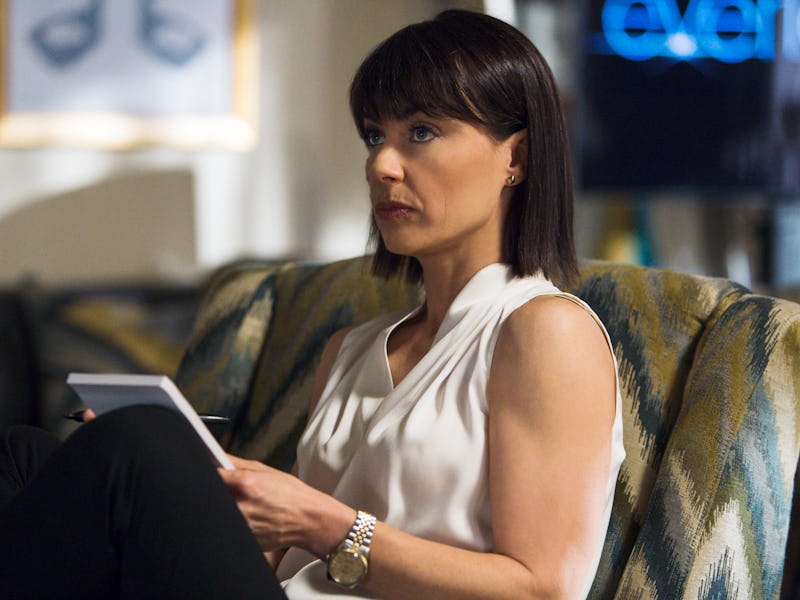Why Quinn is the Emotional Center of ‘UnREAL,' TV's Greatest Psychology Treatise
The viewer's shifting allegiances prove that even Quinn's cruelest machinations have heart.

Another week of UnREAL; another emotional roller-coaster ride of shifting sympathies. Perhaps nothing is as unpredictable on the Lifetime show as our feelings, at any given moment about the show’s most dynamic and complex character (even next to Shiri Appleby’s Rachel, who is the focus of the most recent episode) Constance Zimmer’s Quinn.
In the wake of Rachel’s abuse at the hands of Jeremy last week (the show has been delving into physical as well as mental pain big-time so far this season), one wonders why Quinn is still, seemingly, working against Rachel. At the end of this week’s episode, it’s clear that she’s called in Adam to derail what seems like Rachel’s positive relationship with Coleman.
But if in many ways, Quinn’s conviction that Rachel is bound to her and Everlasti in some kind of codependent indentured servitude is the most dislikeable element of her character, it also betrays her humanity.
There is, simultaneously, the notion that Quinn wants to hold Rachel back and keep her close to her for selfish reasons, both because she is an important tool in the Everlasting mechanism and because Quinn depends on her companionship in a more holistic way. As Dr. Wagerstein points out, Quinn’s refusal to move beyond what she knows and can control is a defensive mechanism — a symptom of her “loneliness.”
But Quinn is, also, looking out for Rachel, even if it may be misguided at times. When she dubs Coleman “her Chet,” and rails against Jeremy, there is the sense that she is eternally trying to ruin Rachel’s potential romances because she believes they will be ultimately destructive for her. It’s not exclusively because she’s trying to control her and keep her unhappy. For Quinn, traditionally, relationships are a source of unhappiness if one doesn’t keep them at arm’s length, especially when they are tied up in the mechanisms of the ruthless industry they work in. But Quinn’s bad experiences with men, we learn this season in particular, extend beyond Chet to her father, certainly, and other dalliances she’s had along the way.
When we see Quinn — just as Rachel seems to be this season — faced with the possibility of happiness with another person, we see that Quinn’s monologues to Rachel about the liability of her romantic entanglements is a reflection of Quinn’s own experience about relationships. It isn’t simply she wants to keep Rachel broken. If she does, it’s because she believes that those feelings of brokenness can be made into strength. Their shared cynicality and willfulness — when they were united as showrunners of Everlasting at the beginning of the season — could have catapulted them to the top of the industry.
Yet it splintered. And here, perhaps, is the flaw in Quinn’s theory. No matter how good she and Rachel may be at making poisonously effective reality television, there can be no smooth sailing when they are both so fundamentally unhappy. Their own unresolved problems will infringe on the on-set proceedings, and find weirder and more lethal ways to shine through. For instance, many of Quinn’s missteps in the first few episodes — ultimately, the reason Coleman was brought onto the show, and that Rachel went behind Quinn’s back — was because she was so hell-bent on undermining Chet.
Ioan Gruffudd and Constance Zimmer in 'UnREAL'
Rachel’s refusal to work through the trauma with Jeremy is affecting her work, as well, even as she convinces herself, on the Alabama trip, that the adversity can be fuel for her creative fire. Quinn — like the viewer, perhaps, periodically — is convinced that Coleman is a negative influence on Rachel, that he is just a “user” looking to get ahead in the industry. In recent episodes, it’s begun to seem like that is not the case, especially this week, when Coleman appears to be truly concerned for Rachel’s well-being, as well as for Bethann’s during the Alabama shoot.
When it becomes clear that Quinn has brought Adam into sabotage the Coleman/Rachel tryst, it appears on the surface to be a diabolical, wholly self-serving move. But really, this is the only way Quinn knows to express care and affection; in the insular world of the Everlasting set, there are limited ways to do this, meaningfully and without appearing weak. Gestures may appear one way, but be intended in another; often they backfire. On the other hand, what might look like a bit of misguided, immature resentment — Jeremy’s campaign against Rachel prior to last week’s episode — may also transform into a hideous beast. It is the beautiful and terrifying contradictions of Quinn’s actions — their antiheroic ambiguity, their unpredictability — which are the crux of this show’s volatile and potent emotional universe.